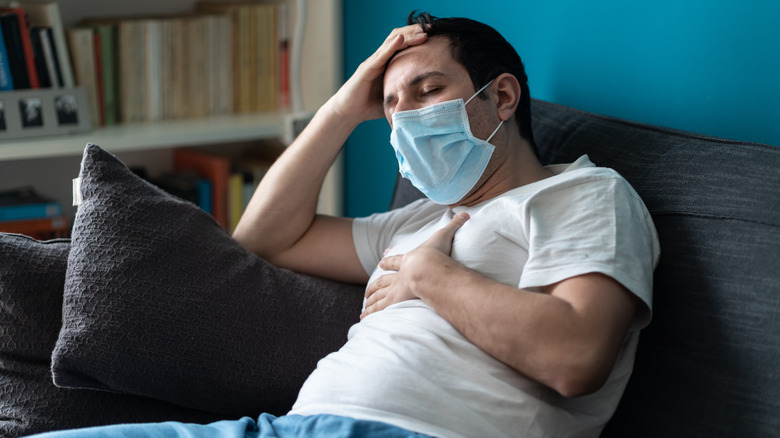How A Healthy Lifestyle May Be The Key To Avoiding Long COVID
Long COVID or health conditions existing at least three months post-COVID infection affects nearly one in five American adults who have gotten COVID in the past, according to the 2022 Household Pulse Survey from the Centers for Disease Control and Prevention (CDC). While experts are still trying to understand the impact of long COVID, a 2023 study via JAMA Internal Medicine found that those who had a healthy lifestyle prior to becoming infected with COVID-19 may be less likely to develop symptoms of long COVID.
Long COVID doesn't necessarily just mean long-lasting COVID symptoms but rather can mean a myriad of health conditions, like autoimmune diseases and unexplained symptoms (via CDC). The most common symptoms reported include fatigue, fever, shortness of breath, cough, brain fog, sleep problems, digestive issues, joint pain, and changes to the menstrual cycle. In addition, long COVID is more common in women than in men, and those between the ages of 50 and 59 are three times more likely to experience symptoms of long COVID than those over 80. While dealing with long COVID can be challenging, developing a medical management plan with your healthcare provider is key to enhancing your quality of life. Most symptoms of long COVID will improve over time. However, maintaining a healthy lifestyle may be a better way to avoid the symptoms altogether.
Making healthy choices can reduce your risk of long COVID
A new study published in JAMA Internal Medicine explored the connection between living a healthy lifestyle before becoming infected with COVID-19 and the risk of developing long COVID. Researchers used six lifestyle factors to determine health: never smoking, seven to nine hours of sleep per night, a body-mass index (BMI) of around 18.5 and 24.9, at least 150 minutes per week of moderate to vigorous physical activity, moderate alcohol consumption, and a high-quality diet.
Researchers studied 1,981 women who had tested positive for COVID between April 2020 and November 2021. Turns out, those who had a healthy lifestyle according to the six health factors were less likely to develop long COVID symptoms four weeks after infection, and those who met five of the six criteria had a 49% lower risk compared with those who had none of the healthy lifestyle factors. All in all, the elements with the biggest impact on risk were sleep and BMI.
However, the study did have some limitations. Since 97.4% of the participants were white, and all participants were female nurses, the results can't necessarily be applied to larger populations without more research. Additionally, some experts believe that BMI is a flawed measure of health since it doesn't take things like bone density, muscle mass, and racial and sex differences into consideration (via Medical News Today).


